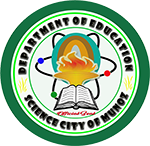Cyril S. Talusan,
Education Program Specialist II
Education is one of the keys to having more opportunities in the future. According to Riley B. King or popularly known as B.B. King, “the good thing about education is that it cannot be taken away by anyone.” Even if having education involves costly resources (time and money), investing in it will be a key for a wealthier future. It doesn’t only improve the financial status but also helps to have a richer mind. Though education is a long-term investment, the time and money used and the courage to move through challenges and persevere will all keep paying for the rest of one’s life. The Philippine Constitution has stated in Article XIV, Section 1 “the right of everyone to quality education at all levels and should be accessible to all.” This means that everyone is entitled to education, and they should not waste their chance on it.
There are lots of benefits in having a formal education. That is why having continuous education amid pandemic has been promoted by the department. Having an education is not just about respect, financial security, family stability, a higher position in society, and a professional environment, education provides all of these and much more. Having home stability helps the children who grew in their own houses achieved the success they want. They are more likely to finish their studies. According to Nelson Mandela, “the most powerful weapon you can use you change the world is the education.” It cannot be taken away by anyone. It is also a key for someone to become a better citizen, obtain a good-paying job, and lets us know the difference between good and bad. However, not all educated people are well-mannered since sometimes they ought to degrade their fellow man. Having education teaches people why does hard work is important and how it helps people develop and grow. Therefore, it helps in having a good society knowing and respecting the rights, laws, and regulations. Understanding different languages through the educational process improves the interaction with different people for the exchange of ideas, knowledge, and good practices. It taught people in living in harmony.
2020 is a tough year for everyone. A lot of unfortunate events happen due to COVID-19 pandemic including loss of job, company closure, panic buying, curfew hours, different levels of quarantine in all places, difficulty in transportation, and many more. One of the affected sectors is education. Parents, teachers, and most especially the learners are affected by it. The opening of classes for the SY 2020-2021 has also been adjusted nationwide based on the consultation to the executive committee, management committee, civil society, business sector, and education experts. Several people have expressed their views online via their social media account between academic freeze or not. Prior to the opening of classes, the sector had conducted surveys not only for the opening of classes, but also matters related to social distancing or the different complementary approach to learning. They have provided different alternatives (online classes, cellphone, radio, and television) to the usual way of doing the conventional way of teaching and learning process.
The Department of Education (DepEd) Secretary Leonor Briones announced on May 8, 2020, that the department’s major response and commitment in protecting the health, safety, and well-being of learners, teachers, and personnel is the Basic Education – Learning Continuity Plan (BE-LCP). Due to the closure of the schools, the teaching had to be done remotely with the use of modular and digital platforms. This is called distance learning. This is a type of learning modality wherein the learners and teachers communicate even if they are geographically remote from each other (Llego, 2021). During this type of approach, the learners were provided with Self-Learning Modules (SLMs) either printed or digital format/electronic copy, whichever is applicable to the learner. It was the division office who decide which approach they will adapt. There are also other learning resources like Learner’s Materials, textbooks, activity sheets, study guides and other study materials. In this approach, the learners who are learning digitally access their modules electronically within the help of computer-based applications. Teachers, on the other hand, are responsible for monitoring and checking the progress of the learners by the submitted Learning Activity Sheet (LAS) and Learning Activity Log (LAL) submitted by the parents to the school during the schedule provided for every grade. On the part of the learners, asking for help or clarification from the teacher is also done in electronic form. They do it via e-mail, telephone messaging, chat via messenger or any other form of communication they have agreed to. On the part of the parent, guardian, or any member of the family, they are the ones, who take the role of the teacher for the meantime or what they called para-teachers.
Even if the delivery of education has changed abruptly due to the pandemic, the aim for education never stops. The department has just adapted a different way of teaching.
